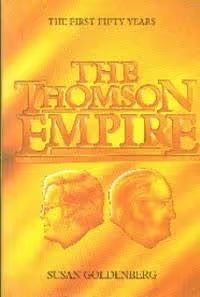Jack Kent Cooke Part 1: The Beginning
The biography about Roy Thomson described a critical partnership with a young man who helped propel Roy’s empire: Jack Kent Cooke. I did some research and learned that Cooke went on to have a prolific career in radio broadcasting, owning cable systems, and owning the NBA’s Los Angeles Lakers, the NHL’s Los Angeles Kings, and the NFL’s Washington Redskins. I wanted to learn more about Jack, so I read The Last Mogul: The Unauthorized Biography of Jack Kent Cooke by Adrian Havill.
Jack was born in 1912 and raised in Toronto, Canada. His parents had immigrated from South Africa and Australia. He grew up in a lower-middle-class family that sometimes struggled financially. Jack wasn’t into school and skipped it for weeks at a time. He finished only three of the five years needed to graduate high school before dropping out. More interested in making money, he tried various things, including forming a band that performed at local school dances. The “high school hustler” lived by his own rules.
In 1934, the Depression profoundly affected North America. Twenty-five percent of Canadians were unemployed. Twenty-one-year-old Jack had eloped with seventeen-year-old Barbara Jean Carnegie and begun traveling door to door to sell encyclopedias. Selling books failed, and Jack went broke. He and Jean moved in with his parents, and he took a traveling salesman job selling Colgate-Palmolive products to stores in remote northern Ontario. During one of these trips, Jack walked into a radio station to ask for a job. Roy Thomson owned that station.
Forty-three-year-old Roy was intrigued by twenty-five-year-old Jack’s persistence and hired him to manage station CJCS in Ontario. With Jean pregnant with their first child, Roy was anxious to prove himself. Jack started at CJCS in January 1937 and worked from when his eyes opened to when they closed. By June, the once-troubled station’s profits were so substantial that Roy sold the station for a handsome profit. Jack had quickly proven himself to Roy while learning the ins and outs of radio broadcasting.
Roy liked working with Jack so much that he offered him the opportunity to become partners by buying in to his next deal: purchasing a Quebec radio station for $21,000. Roy and Jack each put up $1,000, and they financed the remaining $19,000 with a bank loan. A year later, they sold that station for $105,000. Jack was in his late twenties, and this deal was his first big financial win.
Jack started looking for his own radio deals and negotiated to buy a Toronto station for $500,000. He didn’t have $500,000 liquid, so he agreed to put down a deposit, which he would lose if he didn’t close the deal in thirty days. Jack raised the money from wealthy people in Toronto. Interestingly, Roy declined to invest. After taking over, Jack immediately broke unwritten radio rules by broadcasting twenty-four hours a day and introducing other changes. Within a year, Jack had a 35% market share and his was the leading station in Toronto. Within a year or two, Jack repaid each investor $69,000, almost three times their $25,000 investment.
Jack was eager to continue expanding and wanted to buy an Ottawa radio station, but regulators blocked him. To get around the regulators, he signed a consulting contract with the station’s owner: he would manage the station and get 40% of the gross profits before taxes and depreciation, an extremely lucrative deal. In the 1950s, the station generated $1,600,000 in gross profits, of which Jack received $640,000. Jack got what he wanted, but his wheeling and dealing didn’t sit well with regulators. He was developing a reputation as a cowboy who wouldn’t follow the rules.
Jack was hitting his stride as a radio broadcasting entrepreneur and becoming well known in Toronto. He was having professional and financial success, but it didn’t come easy. Jack’s typical workday at a radio station was from 7 a.m. to midnight. It got so bad sometimes that his wife had to go to the station and drag him home. Jack’s employees viewed him as a hard-charging workaholic, notoriously cheap and prone to outbursts when something didn’t meet his standards. One newspaper article in 1949 described him as ruthless, tough, and working every waking moment.
Jack’s style helped him get early wins but also ruffled feathers and got him in trouble with the law.






